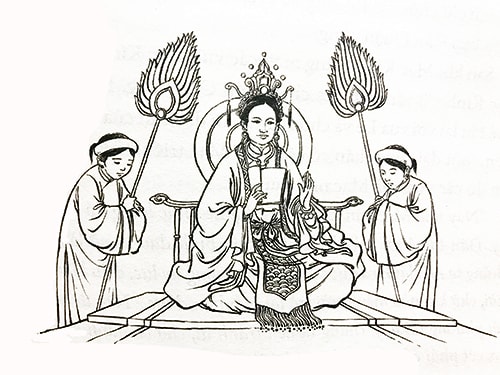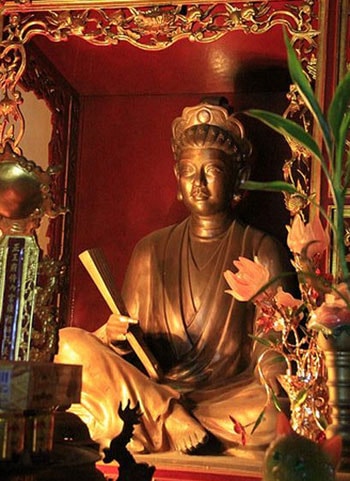The only female doctorate candidate in Vietnamese history created a way to teach remotely.
Disguised as a man to take the exam, Mrs. Nguyen Thi Due passed the exam with the highest score, was highly respected, and became Lady Sao Sa, helping many students study and pass the exam.
During feudal times, women were not allowed to take exams or study. However, the history of Vietnamese imperial examinations still recorded a female champion. That was Mrs. Nguyen Thi Due (some other documents recorded Nguyen Thi Du or Nguyen Thi Ngoc Toan), who lived around the end of the 16th century, the beginning of the 17th century, from Kiet Dac village, Chi Linh district (Hai Duong).
Speaking of which,Approximate border of Dai Nam geographywrite "Am Dam Hoa, Female Doctor" (in Am Dam Hoa there is a female doctor).Dai Nam Nhat Thong Chicall her by name
|
Painting of Mrs. Nguyen Thi Due.Photo of the book "Teachers in Vietnamese history" |
In the late 16th century, the war between the Mac and Le-Trinh dynasties came to an end. According to the bookMac Dynasty and Mac Dynasty Era - More than twenty years of research and understandingc,When the Mac dynasty was in danger, the king sent someone to ask Trinh Nguyen Binh Khiem and he gave him a prophecy "Cao Bang tang tai, tam dai ton co" (meaning if the Mac dynasty fled to Cao Bang, it would survive for three more generations).
In 1592, Trinh Tung led his army to the North, and the Mac army was defeated. Following the advice of Trang Trinh, the Mac general Mac Kinh Chi gathered the Mac descendants and moved to Cao Bang to make a place of refuge. In Kiet Dac village, Mrs. Nguyen Thi Due's family also had to take refuge. Remembering the peaceful years under the Mac dynasty, her family found a way to Cao Bang.
Being intelligent and beautiful, at the age of just over 10, many noble families came to ask for her hand in marriage, but her family did not accept. When life in Cao Bang was stable, Ms. Due continued her studies.
During its prosperous reign in Thang Long, the Mac Dynasty paid great attention to education and periodically organized exams to discover talented people to help the country. In Cao Bang, this dynasty still maintained that tradition to plan for the long term. At that time, the court was weakened but the people still followed it in large numbers, many scholars participated. Nguyen Thi Due disguised herself as a man, took the name Nguyen Ngoc Du to take the exam and successively passed the Huong, Hoi and Dinh exams to become the top candidate. At that time, she was only about 17-20 years old.
BookTeachers in Vietnamese historyWhen the royal court held a banquet to honor the new graduates, Nguyen Ngoc Du was the first to come to pay his respects before the throne. The king and all the civil and military mandarins were surprised by the handsome appearance and leisurely steps of the new top scholar. When the king offered royal wine, Nguyen Ngoc Du came to receive the ceremony. Seeing the top scholar with a rosy face, a slim body, and sparkling eyes, the king became suspicious and asked and learned that Du was actually a girl.
The whole court was astonished because this was an unprecedented crime, not to mention that this was a crime against the king, and it was difficult to escape the death penalty. However, King Mac did not punish her but praised her and showed great respect for her talent and beauty, allowing her to regain her old name and appointing her as a Royal Officer to teach letters and etiquette to the concubines and maids.
Not long after, impressed by her beauty and talent, the king took her as his concubine and granted her the title Tinh Phi, meaning she was as beautiful and bright as a shooting star. Later, people called her "Lady of the Shooting Star".
|
Statue of Mrs. Nguyen Thi Due. |
In 1625, the Le - Trinh army advanced to Cao Bang to destroy the Mac dynasty. The Mac king was captured and brought back to Thang Long. Mrs. Nguyen Thi Due fled to live in hiding at Sung Phuc pagoda in the east of Cao Bang. She was the abbot of the pagoda, taught school and taught etiquette to the children of the villagers. But then the Trinh army, hunting down the remnants of Mac Kinh Cung's army, discovered her hiding place. Nguyen Thi Due was captured and brought before the Trinh lord. Thanks to her humble but intelligent responses, she escaped death and was brought back to Thang Long and treated kindly.
Nguyen Thi Due met Queen Trinh Thi Ngoc Truc (wife of King Le Than Tong). From then on, she often went with the Queen to pagodas and met talented scholars to understand the situation in the country to help the King. She was appointed as Chieu Nghi, above the concubines. Regarding this, the bookDai Nam Nhat Thong ChiRecorded: "King Le summoned her to teach the palace maids and gave her the title Nghi Ai Quan."
When Nguyen Thi Due was an official, she often quoted the meaning of classics and history, ancient and modern stories clearly, so both Lords Trinh Trang and Trinh Tac praised and respected her. King Le and Lord Trinh asked her to review all the memorials and papers for the imperial examinations.
History books record that in the Tan Mui year (1631) examination, there was a very special essay by a candidate. All the mandarins praised her erudite writing style but expressed some difficulty in understanding. When asked, she explained in detail the historical allusions and meaning of the essay, helping the candidate pass the exam with the highest score.
According toTeachers in Vietnamese history, the reputation of Lady Sao Sa spread far and wide. Caring about education in her hometown, she provided money to establish a Literature Association in Chi Linh for children in the area to come and study.
At the Nguyen family temple, many ancient and modern books were placed for everyone to read. On the first and fifteenth day of every month, the candidates gathered to wait for the post horse to bring the exam questions sent by her. The students finished their exams, sealed them in boxes, and the post horse brought them back to the capital for her to grade. Her hometown became a bright spot for studying and passing exams. "Thus, it can be seen that Nguyen Thi Due created the methoddistance learning"It was successful from the very beginning," the group of authors commented.
At the age of 70, Mrs. Nguyen Thi Due asked to return to her hometown Chi Linh, built Dam Hoa hermitage to live, read books, meditate and instruct the scholars in the village. She was given tax money from the village as a salary but only took a small amount for her own expenses, the rest was spent on public works and helping the poor.
Mrs. Nguyen Thi Due died at the age of 80 and was buried in her hometown. The tower built over her tomb is called "Tinh Phi Co Thap" and is engraved with ten words "Le Phi sinh thong tue, nhat kinh chieu tam vuong" (Le Phi is a wise person, a mirror reflecting three kings).
Remembering her merits, the villagers of Kiet Dac built a temple to worship her as a goddess. On the horizontal board are the two words "Hoa Am", inside is a statue of her and a pair of parallel sentences "The first doctorate took the Cao Binh board/The great pen passed down the ancient stele".
At Mao Dien Temple of Literature (Hai Duong), 637 doctors are worshiped, including the tablet of the only female doctor named "Nghi Ai Quan Nguyen Thi Due". In 2004, eight great doctors of Hai Duong province, who were talented people of the country, had bronze statues cast and were worshiped, including the statue of Lady Sao Sa next to talented people such as Chu Van An, Nguyen Trai, Mac Dinh Chi, Vu Huu, Pham Su Manh, and Tue Tinh.


